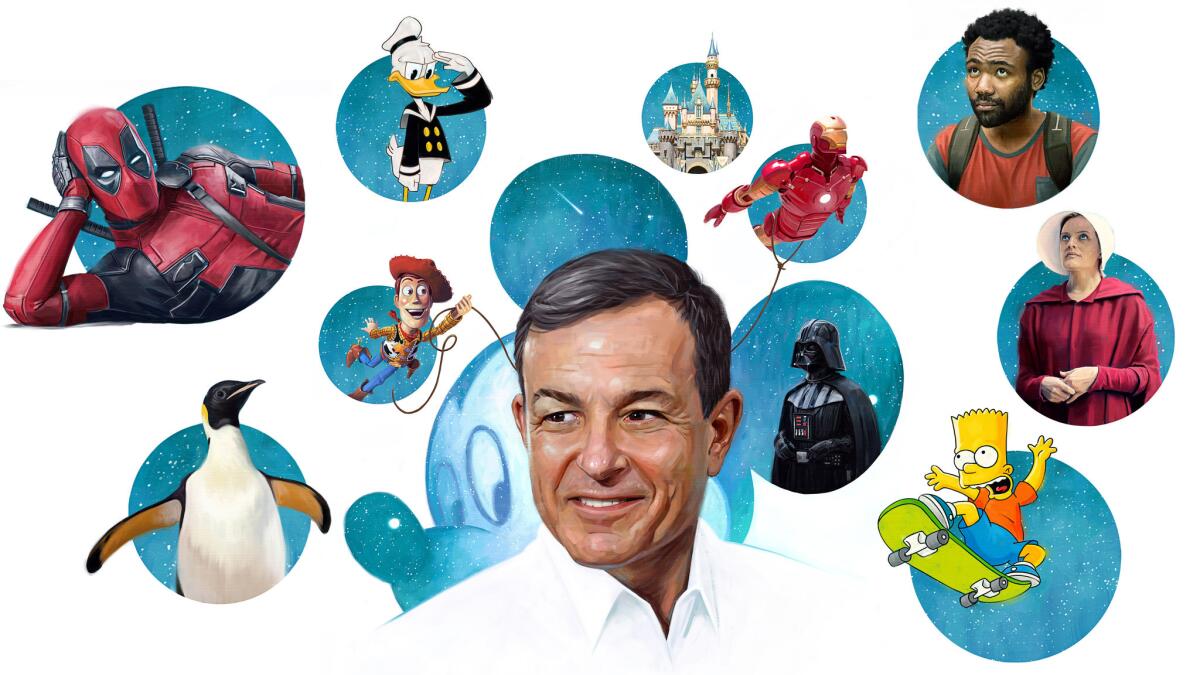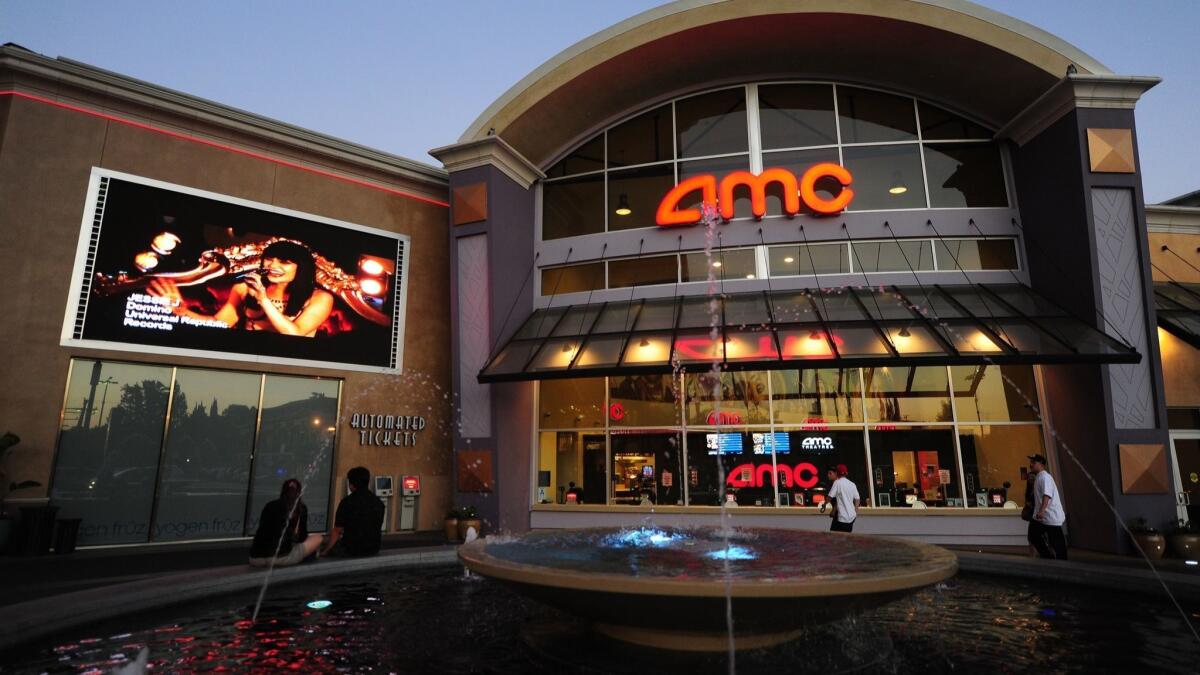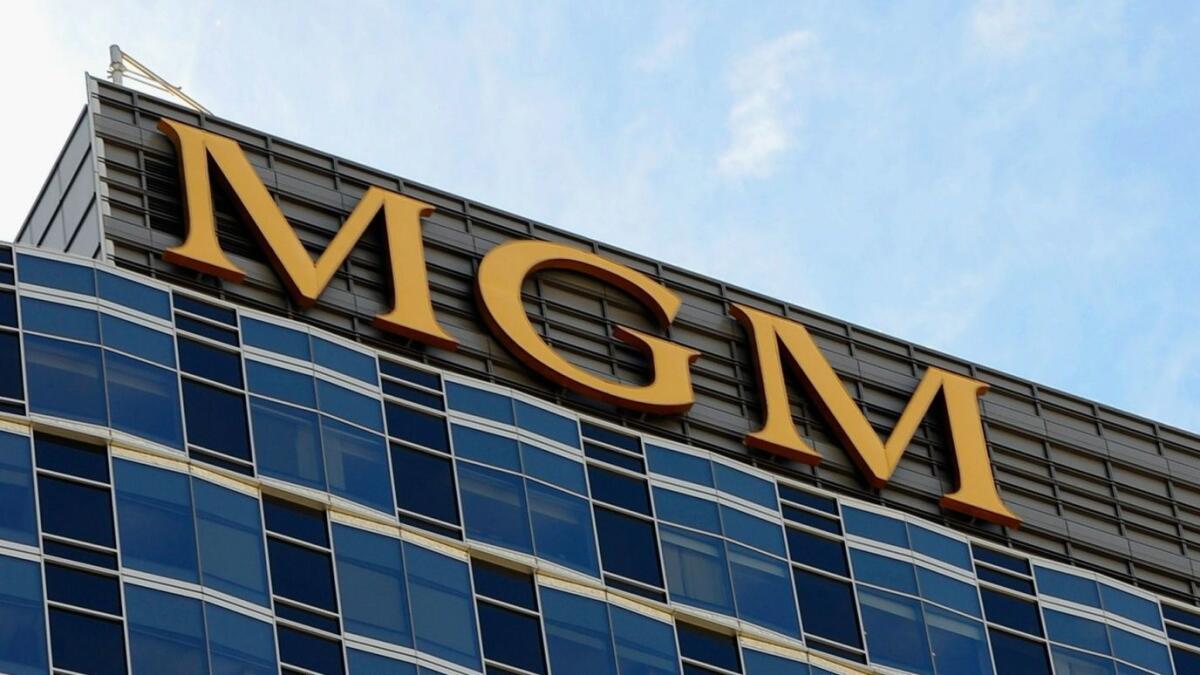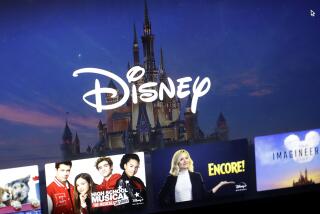With Fox, Disney will have an even bigger footprint in Hollywood

- Share via
Walt Disney Co.’s entertainment kingdom is about to get a whole lot bigger thanks to its pending purchase of 21st Century Fox assets, and the rest of Hollywood has only just begun to grapple with the consequences of the company’s increasing power.
The long-anticipated $71.3-billion acquisition will put the X-Men, Homer Simpson, the Avengers, Buzz Lightyear, Kylo Ren and the gang from “Avatar” under the same roof, giving the Burbank company an unprecedented share of film and television franchises.
The deal, expected to close in the coming days, would boost Disney’s share of the domestic box office to at least 40% and reinforce its stronghold in toys, theme parks and cruise lines. The Mouse House will have an unrivaled say over when and how movies are released.
“Basically, they become the 800-pound gorilla in the media landscape,” said Lloyd Greif, chief executive of L.A. investment bank Greif & Co. “It gives Disney even greater clout from a streaming standpoint, and even greater clout from an exhibitor standpoint.”
The Disney-Fox merger: Everything you need to know »
Disney’s ambitions have taken on a new urgency with the development of its upcoming streaming service, Disney+, set to launch late this year, and its increased ownership of Hulu, both of which will pose a challenge to Netflix. All these moves have wide-ranging implications for the various stakeholders in entertainment, including movie theaters, streaming video companies, talent agencies and pay-TV operators.
“What you have here is the makings of a behemoth in every sense of that word,” said Tuna Amobi, a media industry analyst with CFRA. “It’s hard to think that this deal gives them more leverage than they already have, but it does.”
Some industry insiders are just now coming to terms with the likely fallout of the historic merger, which reduces the number of major studios from six to five overnight.
“I don’t think the industry has remotely digested what that’s going to do to the pulse and culture of the industry,” said one producer, who requested anonymity to allow him to speak candidly without fear of reprisals.
Theater anxiety

With a greater share of box office receipts, Disney could pressure theater owners to fork over a larger portion of the box office for its films. Disney already receives more than 60% of box office receipts for its biggest movies, including the “Avengers” and “Star Wars” pictures. That’s higher than the typical 50% split for movies, and having more franchises will improve Disney’s already formidable negotiating position.
Cinema chains depend on movies like the upcoming “Star Wars,” “Toy Story” and “Frozen” sequels to fill seats, and denying those movies screens is not an option at a time when attendance is under long-term pressure from TV, streaming and video games. Admissions rose 5% to 1.3 billion in the U.S. and Canada last year, but were still down slightly from 2016. However, to the surprise of some cinema operators, the U.S. Department of Justice approved the merger last year with no mention of how Disney’s clout could impact exhibitors.
“This is unquestionably bad for the theater companies,” said Doug Creutz, a media and entertainment industry analyst with Cowen & Co. “Disney has been dominant, and they will dominate more now.”
Disney and the theaters have come to blows before. With the release of 2015’s “Avengers: Age of Ultron,” the company’s demands on exhibitors provoked a rare response from the National Assn. of Theatre Owners, which represents the exhibition industry. In 2013, AMC stopped advance ticket sales for “Iron Man 3” during a dispute over revenue splits.
RELATED: What Disney’s acquisition of Fox could mean for Marvel’s superheroes »
Anxiety has been tempered by the belief that Disney will avoid extracting terms so draconian that they draw the notice of regulators. Some exhibitors argue that they will benefit from Disney having a greater share of the box office, because the company has a strong track record of producing popular entertainment. Theaters should make up ground lost on box office by generating more revenue from concessions.
“Obviously, it’s an industry-changing event,” said Adam Aron, CEO of AMC Entertainment. “But we think it’s an event that will be good for consumers, good for theaters and good for movie makers.”
Eric Wold, an entertainment analyst with B. Riley FBR, said he would be “surprised if they push up rates across the board for everything. If Disney’s going to put its marketing muscle and theme parks behind new titles, maybe that’s worth paying for. You’d rather pay 65% for a billion-dollar film than 50% for a $100-million film.”
But privately, industry executives caution against wishful thinking. Some theaters worry that the number of movies released theatrically will shrink dramatically once the Fox deal closes. Disney focuses almost exclusively on expensive productions that draw huge global audiences, and Fox’s more mid-level films may be scrapped.
Then there’s the looming specter of Disney+, which will feature original Disney content that bypasses theaters. The advent of Disney’s streaming offering and the continued rise of Netflix could accelerate the push by studios to collapse the traditional 90-day gap between a movie’s theatrical release and its availability for home viewing. While theaters have long protested any changes to so-called windowing, fearing damage to their business model, the proliferation of streaming services makes the decline of theatrical exclusivity all but inevitable.
A blow for Netflix?
Los Gatos, Calif.-based Netflix has used its debt-financed war chest to create a jaw-dropping amount of film and TV content, tightening its grip on the viewing public by amassing more than 140 million global subscribers. It flexed its power recently by raising prices by $1 to $2 a month.
But Disney is about to mount a serious challenge to Netflix’s streaming dominance with the launch of Disney+, which it is expected to preview for investors at an April meeting. Disney hasn’t revealed its pricing plan, but has slowly unveiled details, saying it will include a live-action series starring Diego Luna that will take place before the events of “Rogue One: A Star Wars Story,” along with a Marvel show about Loki, the popular trickster god from “Thor” played by Tom Hiddleston. The service will include movies and shows from five brands: Disney, Pixar, Marvel, Star Wars and Fox’s National Geographic.
“These guys are and have been an IP [intellectual property] juggernaut,” said Ric Kay, head of MUFG’s Media, Telecom & Sports Finance practice. “Now you’ve got greater capabilities, greater breadth, wider talent pool and even bigger libraries in Disney’s hands. This will help feed their offerings and be attraction points for subscribers.”
Analysts say Disney’s entry into the streaming wars could slow Netflix’s growth. Disney is also pulling its movies from Netflix, a blow for the company that has benefited from being the streaming home of films such as “Black Panther.” A streaming service with Disney family content may be a no-brainer investment for parents of kids who watch Disney and Pixar movies.
RELATED: Fox oral history: Inside the legendary studio at the end of its run »
Disney has also said it will boost investment in programming for Hulu, currently one of Netflix’s biggest competitors. Disney will own 60% of Hulu after it acquires Fox’s 30% stake in the Santa Monica streamer as part of the deal. Disney is expected to bolster Hulu with edgier Fox programming from channels such as FX Networks.
“The leg up Disney and 20th Century Fox have over the newer streamers is they have a historical knowledge of the television business, and they have been more open to being creative than ever before,” said Kevin Crotty, head of TV lit for talent agency ICM Partners.
But Netflix executives insist they’re not worried. The company recently said it faces more screen-time competition from online video game “Fortnite” than other streaming services.
“We compete so broadly with all of these different providers that any one provider entering only makes a difference on the margin,” said Netflix CEO Reed Hastings in a recent video call with analysts.
Making agencies sweat
The consolidation of the studios will also have ramifications for talent agencies. Having five major film companies instead of six — and fewer theatrical films in the industry — means Disney will be able to extract better deal terms from talent agencies trying to get their filmmaker and actor clients jobs in its shows and movies, industry executives said. Unions such as the Writers Guild of America, which opposed the deal, could also feel pressure.
Agencies are waiting to see how Disney’s purchase of Fox alters its TV strategy. Famously vertically integrated Disney has traditionally made shows that air mostly on networks it owns, including ABC and Freeform. Fox has been more open to producing shows for other networks, creating competition that boosts revenues for agencies. That’s less likely to happen under Disney.
“When competition goes down, you’ve got to think those fees are going to change,” said one producer who asked to remain anonymous to protect relationships.
But agencies are taking solace in the fact that overall job opportunities for talent are increasing because of growing players such as Netflix, Amazon and Apple looking to buy shows and movies for their platforms. The battle for talent has led to some blockbuster producer deals, including those for Shonda Rhimes and Ryan Murphy at Netflix. Agents also are counting on Disney and other traditional players — such as AT&T-owned WarnerMedia — to invest heavily in productions in order to fill their own streaming services with new content.
“I know there’s been a lot of concern, with people saying we’re losing a studio, and that’s going to hurt our business,” said ICM’s Crotty. “I don’t look at it that way. There’s going to be more distribution platforms at the end of the day. There are real deals for showrunners. There are many opportunities to succeed and lots of money to be made.”
How will other studios adapt?

The combination of Disney and Fox will affect other studios on multiple fronts.
Smaller studios like Lionsgate, Metro-Goldwyn-Mayer Studios, Sony Pictures and Paramount Pictures increasingly look like minor-league players, and many of those companies may eventually sell to a content-hungry tech giant or mobile phone carrier.
Some distributors have already tried to downsize, or even rethink their strategies, to adapt to the rapidly changing industry in which mid-budget comedies, adult dramas and thrillers struggle to compete with franchise films released by Disney. Lionsgate recently cut jobs, while CBS Corp. is folding its modest movies unit into its larger entertainment business to focus on making content for streaming.
The group of companies that stands to benefit most from Disney and Fox’s marriage may be the top tier of the remaining major studios: Comcast Corp.’s Universal Pictures and WarnerMedia’s Warner Bros.
Having fewer Fox movies in theaters could create some room on the release calendar for studios like Universal Pictures and Warner Bros. to distribute their own big films. Disney has said little about its strategy for integrating Fox into its film studio business, but Cowen & Co. analyst Creutz estimates the changes could mean five to seven fewer movies released in theaters every year. Fox has typically released 12 to 17 movies a year, plus many more from its Fox Searchlight specialty division.
If anything, Creutz says, there are too many big movies released every year competing for a more fickle moviegoing audience. That’s become a problem for studios that have to spend more on marketing for their pictures to get attention from global audiences.
“It probably does open up a little more room on the slate for the other guys,” Creutz said.
Cord-cutters, rejoice
Even before the Fox deal, Disney has enjoyed considerable power in negotiations with pay-TV distributors because of its ownership of ESPN, which is a must-have for cable and satellite providers.
Because of its clout, the company has largely avoided the high-profile carriage disputes that have embroiled other programmers trying to squeeze cable and satellite firms for higher fees. In late December, Disney and Verizon engaged in a brief spat over licensing fees that would have blacked out ABC, ESPN and other Disney-owned channels, but the two sides reached a deal before the deadline.
Analysts don’t expect the Disney-Fox merger to result in more blackouts. Yes, Disney’s Fox deal will add valuable channels such as FX and FXX to its roster, giving it an even better hand to play in negotiations. But it’s evident to most that Disney doesn’t need “Fargo” and “American Horror Story” to increase its leverage when it already has the leading voice in live sports.
The more likely long-term effect will be a quickening of the pace of cord cutting in the U.S., analysts say. The growth of Netflix and the arrival of Disney+ and WarnerMedia’s streaming service will give consumers more ways to avoid traditional TV packages, which are already in decline. Cable and satellite giants are already trying to adapt with smaller “skinny bundles.” Comcast recently announced it is working on an NBCUniversal streaming offering free for its pay-TV subscribers, in a move to preserve subscriptions and expand its digital business.
“This is all about people not wanting to pay their cable bill, and to get more content for less money,” Creutz said. “How that plays out is the big unknown.”
More to Read
Inside the business of entertainment
The Wide Shot brings you news, analysis and insights on everything from streaming wars to production — and what it all means for the future.
You may occasionally receive promotional content from the Los Angeles Times.











